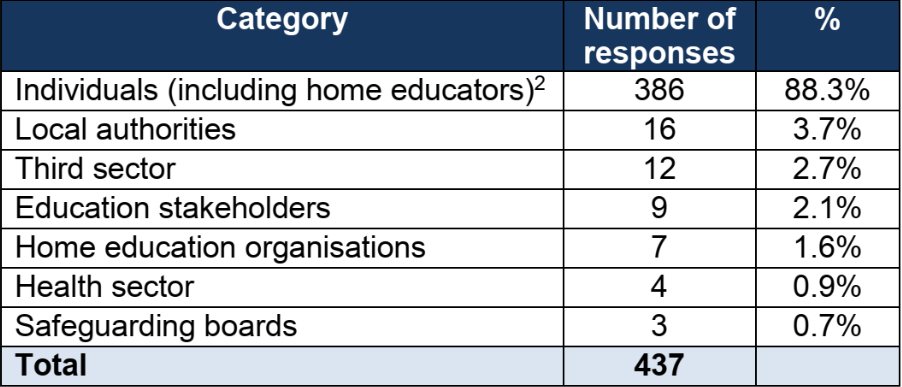What’s been said?
On 21 January the Welsh Assembly Government [WAG] published an analysis of responses to last year’s consultation on “Home Education – Statutory Guidance for Local Authorities and a Handbook for Home Educators.” The sixty-five page document contains over twenty-five thousand words, so it is clearly not designed for bedtime reading! It is, however, an informative analysis of the responses received, and even if the WAG turns a deaf ear to the clarity of arguments made by the HE community, this document confirms that we are caring people who are well informed about both educational approaches and human rights.
The preamble lists the number of responses received and the methodology employed by Arad Research, who carried out the analysis of the responses. Whilst there is insufficient space here to summarise all of this, it is worthwhile reproducing the table listing the types of responses.
 The number of individual responses clearly illustrates the effort put in by many busy parents to do all they can to protect their children’s futures from over-assertive politicians and authoritarian children’s professionals. From the text it is clear that not all education stakeholders and third sector organisations were strongly in favour of the guidance, which suggests that those supporting the proposals accounted for less than ten percent of responses.
The number of individual responses clearly illustrates the effort put in by many busy parents to do all they can to protect their children’s futures from over-assertive politicians and authoritarian children’s professionals. From the text it is clear that not all education stakeholders and third sector organisations were strongly in favour of the guidance, which suggests that those supporting the proposals accounted for less than ten percent of responses.
If this were an exercise in democracy, the proposed change would have been abandoned by now.
The structure of the main body of the report is repeated for each of the twelve main questions, and for the small number of sub-questions. Each section begins by restating the question, followed by a one-line table of the number of responses ticked for each of the three available answers to the “closed question”. The bulk of each section catalogues the “open-ended responses” which were available in most cases. It should be noted that two questions only requested written comments if the respondent agreed with the proposal concerned; many people however ignored this restriction and wrote about why they disagreed with them. It is to Arad Research’s credit that they did catalogue the points raised in these two instances and included them in their summary.
The analysis of responses is reported in a rather repetitive manner. The main points identified in answer to each question are described in order of decreasing frequency. The points raised by the highest number of respondents usually ranged from a quarter to a third of submissions. Other points are then listed in order of decreasing frequency until comments by “under a tenth of responses” are featured, and it is here where comments supportive of the guidance are commonly found. Finally, each section concludes with a “Differences in views between different respondent groups” summary. Whilst these are not all identical, this one for the first question sets the pattern for the majority:
“Individuals and home education organisations were far more likely than other respondent groups to disagree with the question and raise the concerns discussed in the section above. Local authorities, education stakeholders, health sector organisations and safeguarding boards were more likely to express agreement with the question.”
Does that surprise anyone?
The final section, “Additional comments raised by respondents” focuses on eight responses which “provided [a] wider narrative surrounding the consultation and/or education and children’s rights to education.” These responses ignored the prescribed format. Surprisingly, most of them appear to have come from LAs or other organisations seeking to strengthen the provisions, though one is cited which took a different approach:
“One response provided a narrative around how a move to transfer guardianship and educational responsibility for all children from parents to the state violates the ‘unwritten social contract by which governments govern’.” [Emphasis original]
Why does it matter?
When the Minister announced a delay in the WAG’s response to the consultation, she also signalled a determination to publish the new guidance and implement the database regulations this autumn. As we observed shortly afterwards, the delay was caused by responses that “raised complex technical, policy and legal matters which require careful consideration.” The report outlined above confirms the depth and breadth of concern and knowledge behind the responses. Though they may not yet have caused politicians to abandon their plans, they have certainly made them pause for thought.
There remains therefore much work to be done. The mantra of universal state guardianship continues to echo around the corridors of power in Wales and elsewhere, and with it the insinuation that no parent is to be trusted.
What is missing from this summary, as it was from the Ministerial Statement, is any direct reference to the legal opinion by David Wolfe QC, which was submitted by Protecting Home Education Wales as part of their response. Why did this not merit being mentioned in the analysis of responses received? Could this be a signal that the WAG is hoping to circumvent the Human Rights legislation which it was previously ignoring?
What can I do?
As we highlighted in response to the 4 February meeting of the Petitions Committee, it is important that HE families in Wales continue to engage with their AMs over the coming weeks, to keep up the pressure on the WAG to think again.
Wherever you live, if you can summon up the energy and have the time available, reading this analysis will prove very informative – even if somewhat repetitive at times. The arguments it reports against these proposals are valid outside Wales too, wherever parental responsibilities are being undermined by the rise of the safeguarding industry.


